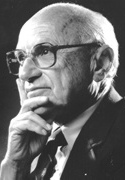
He was a great economist and recipient of the 1976 Nobel Memorial Prize for economic science. See CATO
" Edward H. Crane, president of the Cato Institute, commented on Dr. Friedman's life and legacy: "Here's a guy who won the Nobel Prize in economics for his work in monetary theory and he was a great Chicagoan, a great empiricist and theoretician of economics. But ultimately, what Milton believed in was human liberty and he took great joy in trying to promote that concept...."
Here are a few of my favorite Milton Friedman's Quotes:
"The only way that has ever been discovered to have a lot of people cooperate together voluntarily is through the free market. And that's why it's so essential to preserving individual freedom. "
"Governments never learn. Only people learn. "
"Nobody spends somebody else's money as carefully as he spends his own. Nobody uses somebody else's resources as carefully as he uses his own. So if you want efficiency and effectiveness, if you want knowledge to be properly utilized, you have to do it through the means of private property. "
"Only government can take perfectly good paper, cover it with perfectly good ink and make the combination worthless. "
